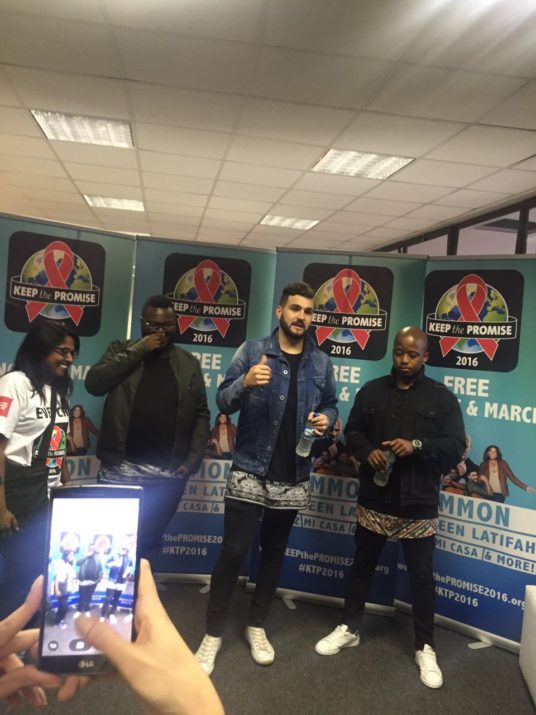
In the first of its kind in South Africa, AIDS Healthcare Foundation led activists, health professionals, patients and artists, including Hip Hop star and actress Queen Latifah, and the super sexy US rap star Common on a march through Durban central business district and rallied for an increase in funding for HIV/AIDS treatment.
The march was then followed by a concert at Sahara Stadium Kingsmead.
AIDS activists, health professionals, patients and artists, including Hip Hop artists, Queen Latifah and COMMON, marched through Durban central business district on Saturday July 16 and rallied for an increase in funding for HIV/AIDS, citing diminishing urgency in winning the war against the epidemic as a threat that could reverse the gains that have been made thus far.
Organised by the AIDS Healthcare Foundation (AHF) under the ‘Keep the Promise 2016’ banner, activists urged decision makers in government, business and development agencies to commit more resources for HIV/AIDS response. The March and Rally was led by Queen Latifah, who then hosted a free Concert at Durban’s Sahara Stadium Kindsmead featuring Common, multi-award Zambian Dancehall artist B Flow, popular Durban Kwaito group Big Nuz and award-winning band Mi Casa.
This took place prior the 21st International AIDS Conference, the Durban ‘Keep the Promise 2016’ March and Concert bookends a parallel ‘Keep the Promise’ concert that took place 8,600 miles away in Cleveland,yesterday and called for similar action on the fight to end AIDS in the US and globally.
Now in its fifth year, the inaugural ‘Keep the Promise’ March and Concert took place in Washington, DC, in July 2012 – just before the opening of the International AIDS Conference when it was in that US capital city.
“Our goal with ‘Keep the Promise’ is to make as loud a cry for help and support as possible in Durban this month so that when we return here in another sixteen years, it will be to celebrate the end of AIDS,” said Michael Weinstein, President of AIDS Healthcare Foundation (AHF).
While acknowledging the progress that’s been made to fight the diseases, Mr Weinstein urged stakeholders not to be complacent. “The irony is that we are the victims of our own success. As the AIDS situation improves, the urgency of winning the war against AIDS is diminishing.”
Appealing to decision makers attending the 21st International AIDS Conference, Mr. Weinstein said: “The 2000 Durban AIDS Conference stirred the conscience of the world to take action, which has saved millions. This conference can ensure that the financial and treatment pledges since that time will be kept. Unfortunately, the majority of people with HIV worldwide are not yet treated. There are still millions of deaths and new infections happening. Yet we still have to beg for every dollar from the US and other governments,” he said. “There is no ‘End to AIDS’ without adequate funding. Now is not the time to retreat. We must ramp up to stop the spread of HIV and truly defeat AIDS.”
According to UNAIDS figures, 37 million people across the world live with HIV, but only 17 million are on treatment. Millions of HIV positive people are not aware of their status. The United Nations’s goal is to end AIDS by 2030, but that is unlikely to happen with the diminishing urgency displayed through insufficient funding being channelled towards HIV/AIDS programs.
Dr. Penninah Iutung Amor, Africa Bureau Chief for AHF, said the global community has an obligation to try and finish the job and end the AIDS epidemic. “Our ‘Keep the Promise’ march and concert provide a tremendous forum for advocates from Africa and around the world to press world leaders to articulate clear global policies on HIV/AIDS–including adequate and ongoing funding for the Global Fund and other organizations,” she said.
Thousands of people attended the Keep the Promise 2016 March and Concert to raise awareness about HIV/AIDS and to support the call for more funding to combat the disease.
Giving her message of support, Gail Johnson, Founding Director of Nkosi’s Haven, said: “I know from personal experience how access to treatment saves lives. It is tragic that more than 15 million people still don’t have that access and so frustrating to watch countries like China, a global economic powerhouse, fail to meet their commitment to the Global Fund. Without funding millions of people will continue to lose their lives to this terrible disease. I support Keep the Promise because we all need to keep fighting. AIDS is not over.”
Patrick Mdletshe, Deputy Chairperson of the Treatment Action Campaign (TAC), said without scaling up funding, it will be impossible to provide treatment to the more than 15 million people who still don’t have access. “Good intentions and catchy slogans won’t end AIDS. We need government commitment, sustained funding and accountability to reach any of the lofty goals generated by UNAIDS,” he said.






